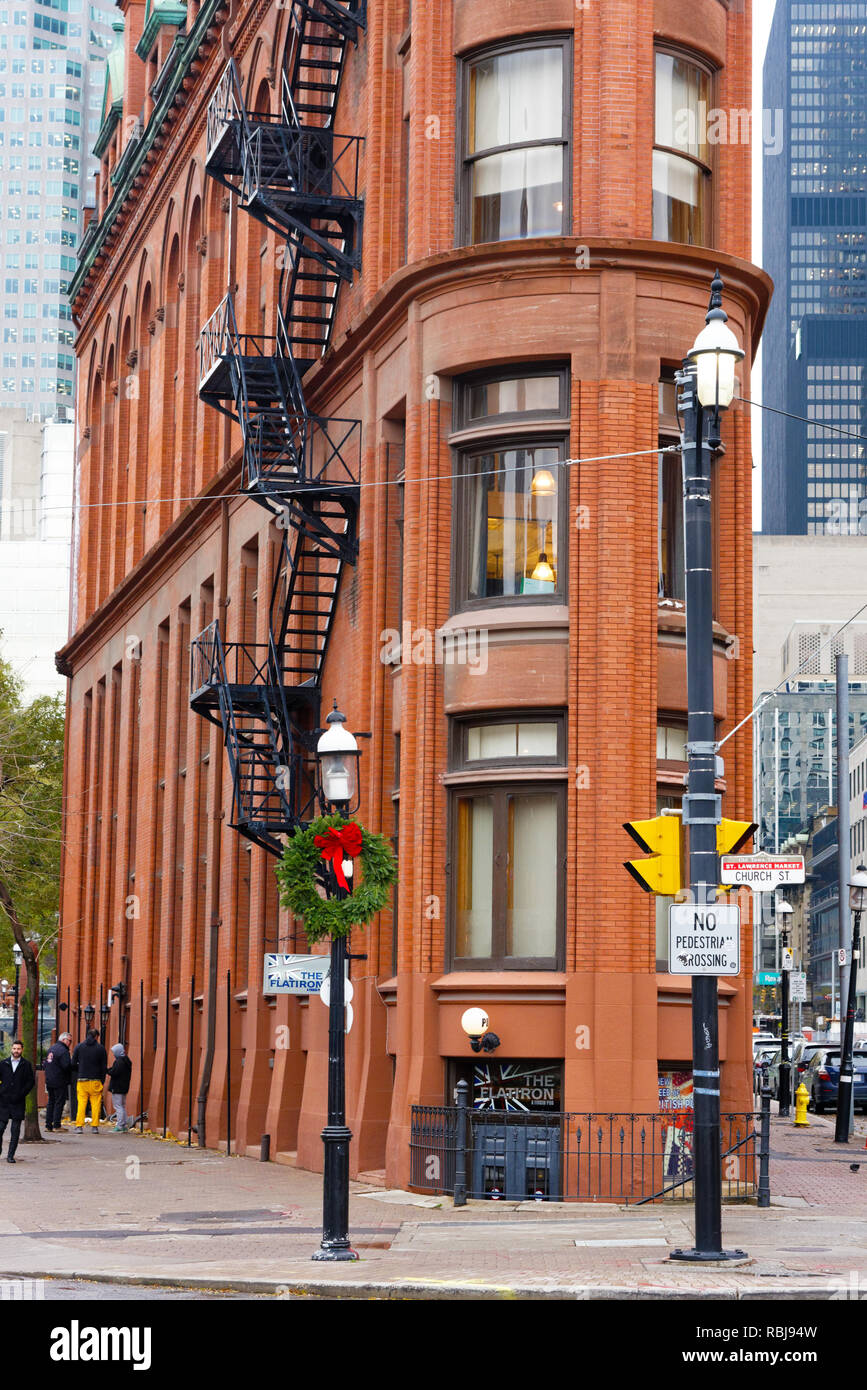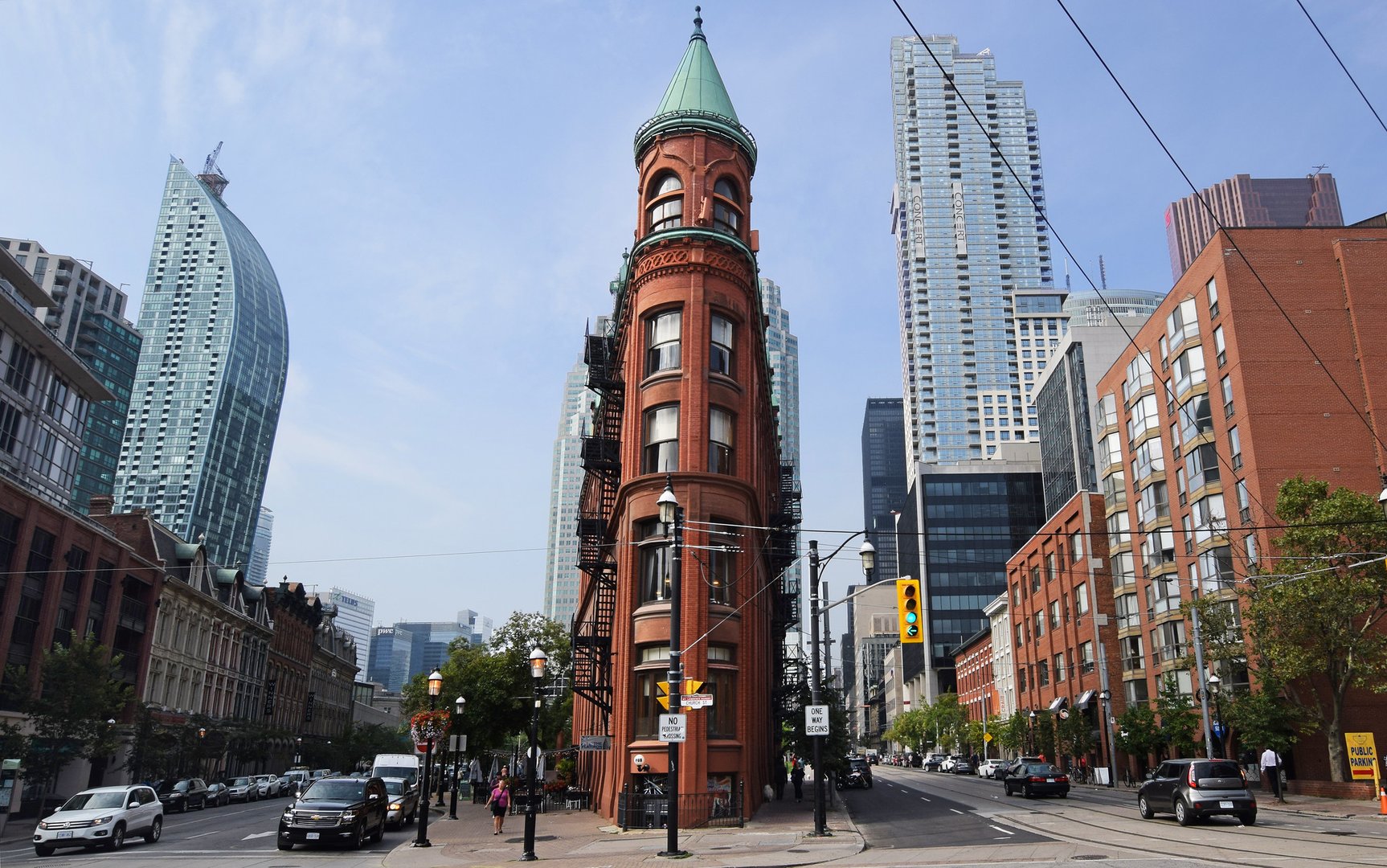Check Out the Historic Relevance of the Gooderham Structure Situated in Toronto
The Gooderham Building, completed in 1892, embodies an abundant tapestry of Toronto's building and commercial background, developed by the noteworthy David Roberts Jr. As it stands today, the Gooderham Building proceeds to play a crucial role in the city's cultural landscape, motivating a more detailed exam of its continuous impact on both the local economic situation and neighborhood identity.
Architectural Layout and Design
Although the Gooderham Building, typically referred to as the Flatiron Building as a result of its unique form, showcases an interesting mix of building styles, it is mostly identified by its Romanesque Resurgence design. This building choice mirrors the impact of 19th-century trends, stressing durable forms and intricate describing. The building's three-dimensional facade attributes rounded arches, hefty stonework, and ornamental block patterns, which together develop a sense of monumentality and permanence.
The framework's unique triangular account, which results from its place at the intersection of Front and Wellington Streets, additionally boosts its architectural value. The sharp angles and cascading rooflines add to a dynamic silhouette that attracts attention against Toronto's sky line. Additionally, making use of terra cotta and red block products adds heat and appearance to the building, welcoming closer inspection and recognition of its craftsmanship.
Moreover, the Gooderham Structure's ornamentation, including cornices and gargoyle-like numbers, exhibits the artistic flourishes regular of the Romanesque style. This interest to information not just enhances aesthetic charm but likewise offers to share the structure's historical and cultural value, strengthening its standing as a valued architectural landmark in Toronto.

Historic History and Construction
The Gooderham Structure's building importance is deeply rooted in its historical context and building and construction. Finished in 1892, this legendary structure was originally made as a distillery storage facility for the Gooderham and Worts Distillery, among the largest distilleries worldwide at the time. The structure was conceived throughout a period of quick industrial development in Toronto, showing the city's burgeoning economic landscape.
Built using regional block and featuring a distinct flatiron form, the Gooderham Building stands at the intersection of Front and Wellington Streets, exhibiting the innovative spirit of late 19th-century design. The design, connected to architect David Roberts Jr., includes elements of Romanesque and Gothic designs, showcasing complex detailing and a popular turret that even more boosts its silhouette.
The structure's construction was marked by the use advanced design strategies for the era, enabling it to climb to six tales while suiting the functional demands of the distillery. In time, the Gooderham Structure transitioned from commercial use to industrial and retail rooms, yet it remains an essential part of Toronto's architectural heritage, symbolizing the city's historical evolution and durability.

Financial Influence On the Area
Since its completion, the Gooderham Building has actually substantially influenced the local economic situation, working as a catalyst for development and advancement in the surrounding location (Gooderham Building address). Its famous design and tactical area in the heart of Toronto have actually attracted many companies and professionals, cultivating an environment ripe for entrepreneurship and financial investment
The structure's distinct style and historic relevance have made it a focal factor for tourism, attracting visitors from around the globe. This influx of visitors has actually promoted neighborhood organizations, including dining establishments, shops, and social venues, therefore enhancing the total financial vitality of the district. The presence of the Gooderham Structure has actually led to increased residential property worths in the location, contributing to local earnings through residential property tax obligations.

Cultural Value and Events
Beyond its economic contributions, the Gooderham Structure holds substantial social importance in Toronto's landscape. As a remarkable building gem, it embodies the Victorian Romanesque style, showing the city's historical evolution. The building's renowned flatiron form adds to its condition as a precious icon of Toronto, drawing in both locals and vacationers alike.
The Gooderham Structure works as a vivid background for numerous social occasions and creative activities (Gooderham Building address). It frequently holds art exhibits and neighborhood events, promoting a sense of connection among residents. Additionally, its presence enhances the personality of the St. Lawrence Market location, recognized for its abundant background and lively neighborhood life
Movie and photography lovers usually look for out the Gooderham Structure for its stunning looks, making it a prominent topic in different media. Directed walking tours regularly highlight the structure's interesting stories, connecting it to Toronto's wider historical story.
Additionally, the Gooderham Structure plays a critical function in celebrating neighborhood society, with close-by events such as the Toronto International Movie Celebration and the Doors Open Toronto initiative often including it as a crucial site of interest (Gooderham Building address). Its long-lasting legacy emphasizes the relevance of protecting social sites within an evolving city atmosphere
Conservation and Repair Efforts
Amidst Toronto's dynamic city landscape, preservation and restoration initiatives for the Gooderham try this website Building have actually become necessary in maintaining its building integrity and historic relevance. Constructed in 1892, this legendary structure mirrors the distinctive Flatiron style, identified by its distinct triangular form and elegant brickwork. Continuous initiatives aim to safeguard its initial attributes while adapting to modern-day needs.
The preservation procedure involves careful analyses to guarantee any repair services or remodellings recognize the structure's historical context. Techniques such as utilizing period-appropriate materials and experienced workmanship are used to retain the authenticity of the frontage. Furthermore, cooperation with heritage conservation experts has been crucial in creating strategies that align with local standards.
Over the last few years, the Gooderham Building has undergone restoration to enhance its structural stability while preserving its aesthetic charm. The establishment of a preservation strategy makes certain that future changes will certainly value the structure's character, promoting sustainable use that honors its past.
These efforts not only protect a vital item of Toronto's building heritage however likewise foster neighborhood engagement by encouraging public appreciation of this historic spots. Eventually, the Gooderham Building stands as a testament to the city's commitment to preserving its abundant background for future generations.
Final Thought
The Gooderham Building exemplifies substantial building and historical value within Toronto's landscape. Its distinctive design and historical function as a distillery warehouse mirror the city's commercial past while adding to its economic and social vitality. The ongoing conservation initiatives guarantee that the building's heritage sustains, promoting a gratitude for heritage among contemporary development. As a vivid industrial space and social hub, the Gooderham Structure remains to play a vital duty in Toronto's community and tourist.
Comments on “Gooderham Building Weather: Climate Guide for Your Day Trip.”